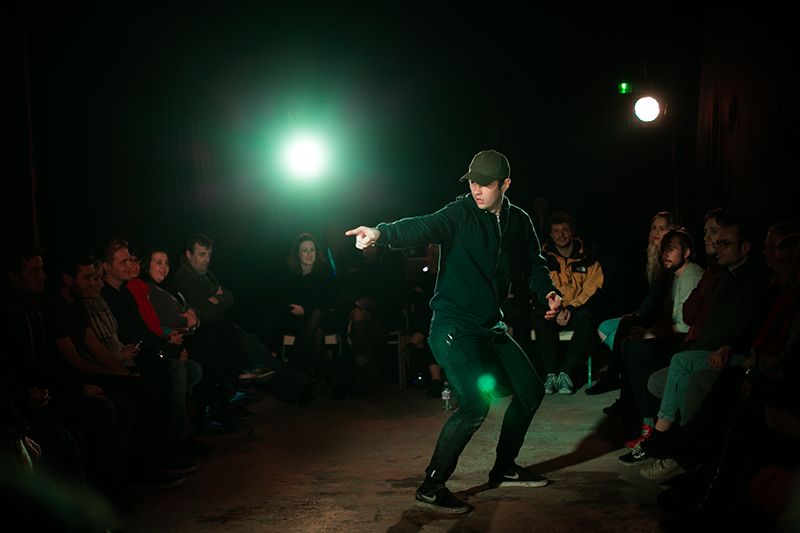“You watch porn… you don’t have to tell us. That’s not what this is about.” So proclaims the flyer for a show named after a 1950s sexual experiment. Unfortunately this quote turns out to be rather prescient.
With the audience placed in the round, Robbie Gordon divvies out various props (including coloured balls, a takeaway, a packet of Skips) whilst prepping those he’s chosen to take part when required later. Donning a pair of safety goggles, he explains the history and method of the Coolidge Effect whilst outlining two mini “cages” on the floor. He’s already very personable, engaging and making the most of the intimate staging. Layered throughout, the audience participation is warm and humorous and helps to break up what forms the bulk of this show: four intertwining narratives.
With Gordon relaying three of these, his ability to flip from one personality to the next signalled by the wearing of a hoodie or baseball cap is accomplished. Retrospect, coming across as a latter day Eminem at some sort of porn anonymous meeting, forcefully spews rhetoric. Meanwhile, in teenage George and his porn-addicted father Gary, Gordon presents a powerful look at a dysfunctional relationship. Indeed, the sight of George (represented by an audience member wearing his cap and playing away on his Gameboy) talking at his implacable son, desperately thinking of a topic to connect with, is a high point. Dramatic, moving and rendered slightly farcical by the tinny 8-bit game soundtrack, this was a tragic showstopper. However, it has nothing to do with porn addiction.
Although compellingly delivered by Megan Forgan (who appears halfway through as a “professional plant” in the audience, giving rise to a great dance moment) the speech/monologue from character Gail just feels out of place. Gail is only used for this one storytelling sequence, expounding on the wonders of virtual reality for porn at a conference. It’s a frustrating section as it seems to have no context. Does Gail inhabit 2017, or some sci-fi future? The fact she’s dispensed with and has no relationship to the three male narratives is rather awkward.
This fact is emblematic of how The Coolidge Effect ultimately falls between several stools. Was it drama? A history lesson? Science lesson (goggles = “here comes the science bit”)? Social dialogue? Physical performance? By trying to be all of these there was no cohesion, only an identity crisis.
Most disappointingly, it is not an entirely successful examination of the subject matter. Porn truly isn’t what it’s about so much as addiction in general, a point unwisely hammered home when Gordon mentions drugs, alcohol et al as being other causes of addiction. Its heart is in the right place and it’s compellingly delivered, but more focus to make the central subject truly integral wouldn’t go amiss.
